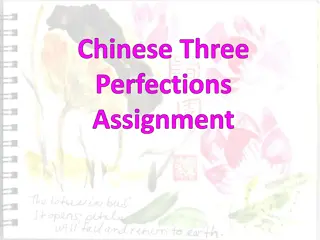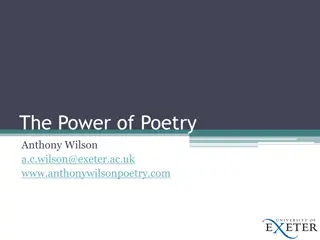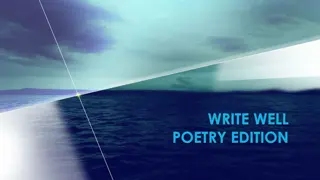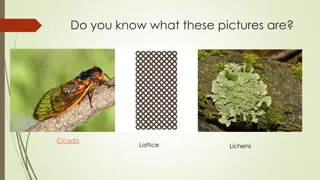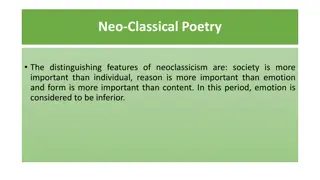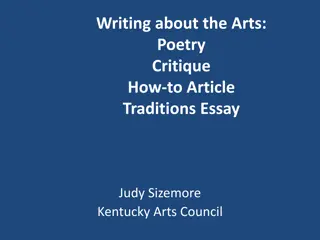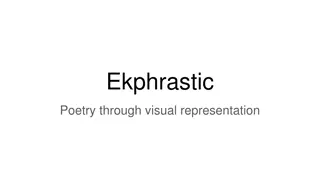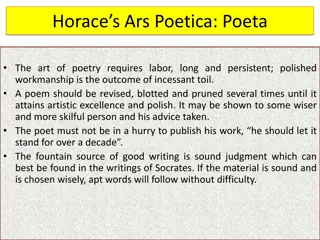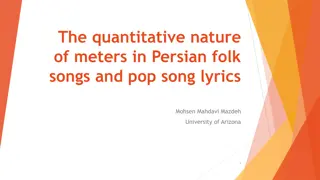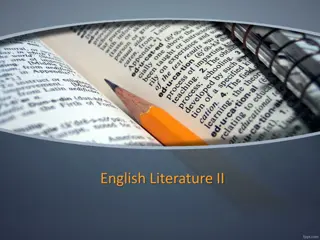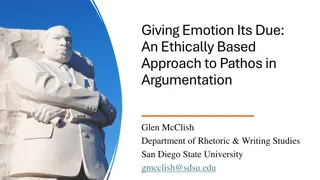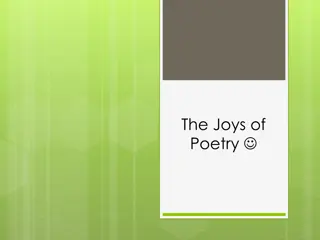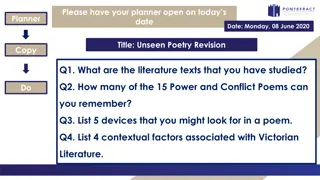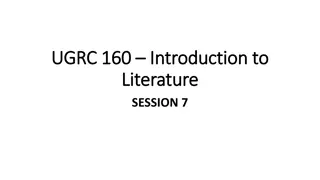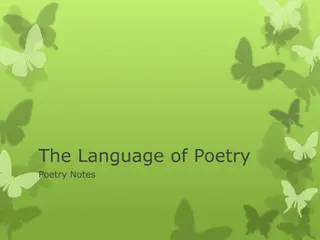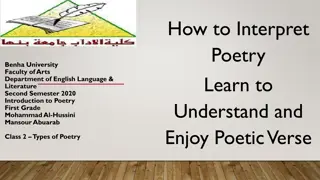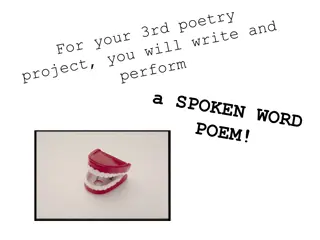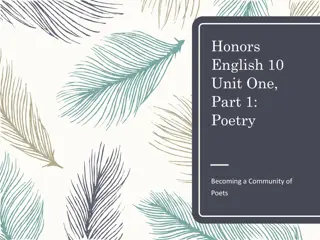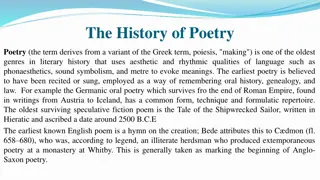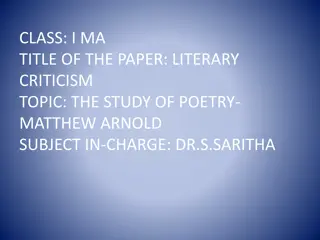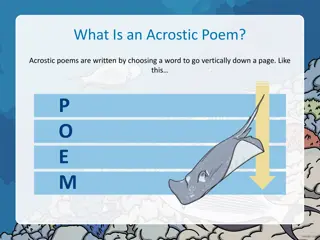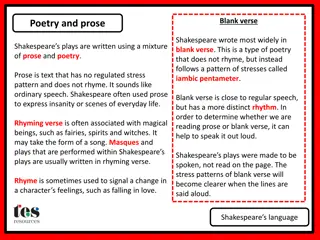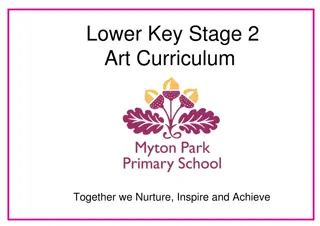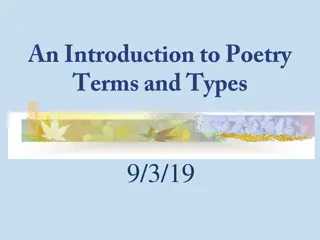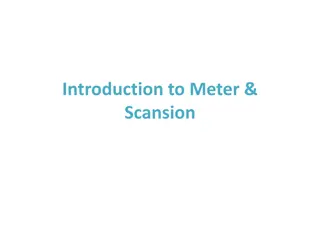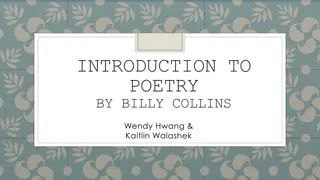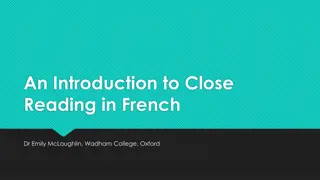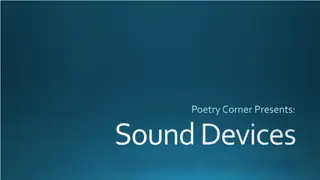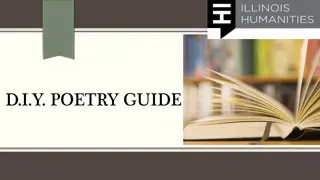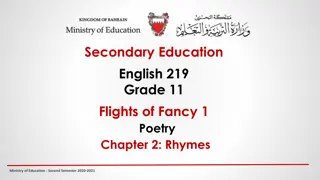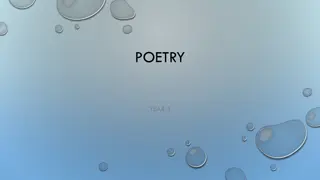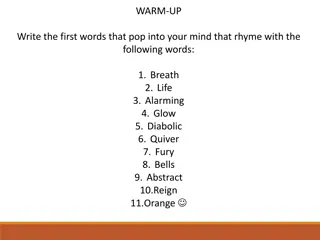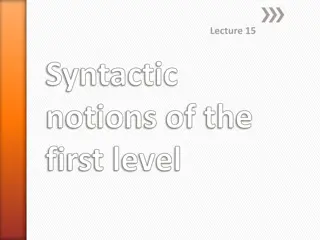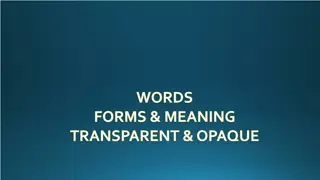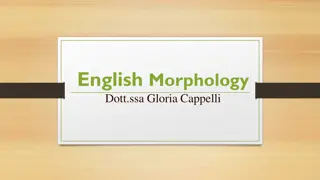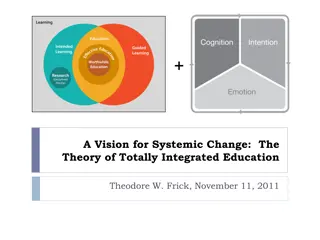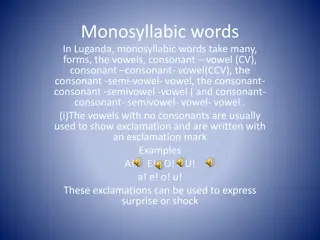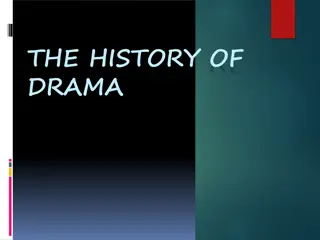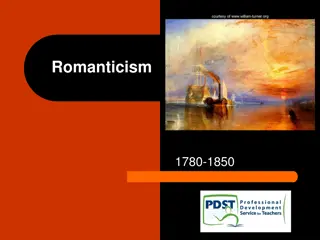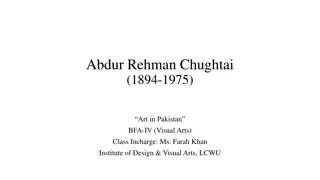The Art of Poetry: Words, Form, and Emotion
Explore the essence of poetry through the eyes of Margaret Atwood, Alan Cross, and the importance of content and form. Dive into the power of concise language, the arrangement of words, and the emotional impact of poetic expression. Discover how the positioning of words on a page can enhance the message and evoke deep emotions. Engage in the beauty of poetry, where every word carries significance and every line paints a vivid picture.
Download Presentation

Please find below an Image/Link to download the presentation.
The content on the website is provided AS IS for your information and personal use only. It may not be sold, licensed, or shared on other websites without obtaining consent from the author. Download presentation by click this link. If you encounter any issues during the download, it is possible that the publisher has removed the file from their server.
E N D
Presentation Transcript
Margaret Atwood on poetry: For me it has a lot to do with the rediscovery of language or concentration on the word. If you re writing a novel, you re concentrating on much larger units-not that you don t pay attention to your sentences et cetera, but the potency of the individual word tends to be more spread out. You re really concentrating on starting something on page 30 that you finish on page 250. The wavelengths are a lot longer, the pattern much larger. Poetry is a very concentrated form, and therefore the explosiveness of each word becomes much greater. Margaret Atwood, Canadian author: The Handmaid s Tale, The Blind Assassin, Oryx and Crake, among others.
Poetry is economical use of words. Its maximum information, emotion entertainment and enlightenment in the fewest words possible no matter how complex the subject. Alan Cross, The Ongoing History of New Music episode 197 Deconstructing the Arctic Monkeys (podcast)
Which is a better way to share a message? (Hunter s lament by Edward John) (B) GOOSE GOOSE GOOSE GOOSE GOOSE GOOSE GOOSE (A) GOOSE GOOSE GOOSE GOOSE GOOSE GOOSE GOOSE WHY FLY SO HIGH? WHY FLY SO HIGH?
*OR* how about this? GOOSE GOOSE GOOSE GOOSE GOOSE GOOSE W-H-Y F-L-Y S-O H-I-G-H ? GOOSE
Poetic Content and Form Content: The meaning or significance of a literary or artistic work. The content of a poem refers to the "what" - that it describes, tells or shows. A poem's content includes the context or situation of the poem as well as the subject, matter, meanings, theme and purpose. Form: The metrical or stanzaic organization of poetry. This is an elaborate way of saying "the placement of words and spaces in a poem to help create the intended effect . This can include something as highly structured as a sonnet or haiku, or something very loose, like free verse. The Form of the poem is the "how" - how the poet communicates the poem's content with the audience. Describing a poem's form means addressing such matter as figures of speech, sound devices, and imagery used by the poet to accomplish his or her purpose.
How can the positioning of words on the page contribute to this poem? Try it yourself! take these words and put them on the page the way you think is most effective. Bad Dream A few minutes ago you called out my name and I found you sitting in the middle of your bed in the dark trembling. What had stepped out of your dreams and chased you this time? Just a pretend bear, Daddy? I stroke your hair, damp with sweat, and in a moment, you re asleep. I dread the time that s coming the time when your tears can t be kissed away by me.
How does the positioning of words on the page contribute to this poem? Why do these words get their own lines? As it turns out, this is not the final draft of this poem Does this change the context of the poem? WHOSE BAD DREAM?
Whats the difference? What effect is achieved by presenting these words in this manner?
I write half the poem. The reader writes the other half What does this mean?
Where Connections can go wrong If you only have a hammer, you tend to see every problem as a nail. Abraham Maslow
3. Try to meet a poem on its terms not yours. If you have to relate to a poem in order to understand it, you aren t reading it sufficiently. In other words, don t try to fit the poem into your life. Try to see what world the poem creates. Then, if you are lucky, its world will help you re-see your own. Reading a Poem: 20 Strategies By Mark Yakich The Atlantic, November 2, 2014 https://www.theatlantic.com/entertainment/archive/2014/11/how-to-read- poetry-a-step-by-step-guide/380657/
I write half the poem. The reader writes the other half
writers depend on the reader bringing personal experiences and prior knowledge to the story. ***Best Joke Ever Alert*** What do you call a fish with no eyes? A fsh Why is this funny?
How much did the pirate pay for his piercings? A buck an ear. Why couldn t Ben go to the Pirate movie? It was ARRRRR rated.
Read the following and write down the connections you make to understand these poems: Rhymes for a Modern Nursery Two Blind Mice Jack and Jill Two Blind Mice See how they run! They each ran out of the lab with an oath, For the scientist s wife had injected them both. Did you ever see such a neat little growth On two blind mice? Jack and Jill Went up the hill To fetch some heavy water They mixed it with some dairy milk And killed my youngest daughter
Read the following and write down the connections you make to understand these poems: Rhymes for a Modern Nursery Two Blind Mice Jack and Jill Two Blind Mice See how they run! They each ran out of the lab with an oath, For the scientist s wife had injected them both. Did you ever see such a neat little growth On two blind mice? Jack and Jill Went up the hill To fetch some heavy water They mixed it with some dairy milk And killed my youngest daughter
Read the following and write down the connections you make to understand these poems: Rhymes for a Modern Nursery Two Blind Mice Jack and Jill Two Blind Mice See how they run! They each ran out of the lab with an oath, For the scientist s wife had injected them both. Did you ever see such a neat little growth On two blind mice? Jack and Jill Went up the hill To fetch some heavy water They mixed it with some dairy milk And killed my youngest daughter
Language choices as form. What has happened in this poem? Write a paragraph to explain what you think has happened.
What is the one key word that unlocks this poem?
Language choices are precise! la dy [ley-dee] noun, plural -dies, adjective noun 1.a woman who is refined, polite, and well- spoken: She may be poor and have little education, but she's a real lady 2.a woman of high social position or economic class: She was born a lady and found it hard to adjust to her reduced circumstances.
Dictionary.com is your friend! de funct adjective 1. no longer in effect or use; not operating or functioning: a defunct law; a defunct organization. 2. no longer in existence; dead; extinct: a defunct person; a defunct tribe of Native Americans.
Would this poem hold greater meaning if you knew who Buffalo Bill was? choose a word like defunct ? Why Why does the text appear to cascade (hint) down the page? What literary tool is used with this selection of words? What does this effect emphasize? Why are these words crammed together? How do you break a pigeon?
I write half the poem. The reader writes the other half
Cummings own notes on another poem. These notes were sent to Cummings translator in Brazil, emphasising specific form features of the poem.
More cummings! e.e. cummings - [l(a] l(a le af fa ll s) one l iness
Another cummings classic When does this poem take place? LISN bud LISN, I needja ta splain de fect a dis pome. Where does this poem take place? Kenya dewit? What is happening in this poem? Yul prolly gunna hafta speriment wit da woids ahlawd. Make sure you justify your answers. Yunnuhstand?
Whatcha wanna do tonight? I dunno. whatchoo wanna do? I m gunna geta pizza. Ya cummin ?
Another cummings classic When does this poem take place? LISN bud LISN, I needja ta splain de fect a dis pome. Where does this poem take place? Kenya dewit? What is happening in this poem? Yul prolly gunna hafta speriment wit da woids ahlawd. Make sure you justify your answers. Yunnuhstand?
Dulce et decorum est Bent double, like old beggars under sacks, Knock-kneed, coughing like hags, we cursed through sludge, Till on the haunting flares2 we turned our backs And towards our distant rest3 began to trudge. Men marched asleep. Many had lost their boots But limped on, blood-shod. All went lame; all blind; Drunk with fatigue; deaf even to the hoots4 Of tired, outstripped5 Five-Nines6 that dropped behind. Gas!7 Gas! Quick, boys! An ecstasy of fumbling, Fitting the clumsy helmets8 just in time; But someone still was yelling out and stumbling, And flound'ring like a man in fire or lime9 . . . Dim, through the misty panes10 and thick green light, As under a green sea, I saw him drowning. In all my dreams, before my helpless sight, He plunges at me, guttering,11 choking, drowning. If in some smothering dreams you too could pace Behind the wagon that we flung him in, And watch the white eyes writhing in his face, His hanging face, like a devil's sick of sin; If you could hear, at every jolt, the blood Come gargling from the froth-corrupted lungs, Obscene as cancer, bitter as the cud12 Of vile, incurable sores on innocent tongues, My friend, you would not tell with such high zest13 To children ardent14 for some desperate glory, The old Lie; Dulce et Decorum est Pro patria mori.15 WILFRED OWEN 1893 - 1918
Dulce et decorum est Dulce et decorum est pro patria mori: mors et fugacem persequitur virum nec parcit inbellis iuventae poplitibus timidove tergo. How sweet and fitting it is to die for one's country: Death pursues the man who flees, spares not the hamstrings or cowardly backs Of battle-shy youths. Horace (Odes iii 2.13):
They wrote in the old days that it was sweet and fitting to die for one s country. But in modern warfare there is nothing sweet nor fitting in your dying. You will die like a dog for no good reason. Ernest Hemingway
Owen was killed in action on 4 November 1918 during the crossing of the Sambre Oise Canal, exactly one week (almost to the hour) before the signing of the Armistice and was promoted to the rank of Lieutenant the day after his death. His mother received the telegram informing her of his death on Armistice Day, as the church bells were ringing out in celebration.
1 DULCE ET DECORUM EST - the first words of a Latin saying (taken from an ode by Horace). The words were widely understood and often quoted at the start of the First World War. They mean "It is sweet and right." The full saying ends the poem: Dulce et decorum est pro patria mori - it is sweet and right to die for your country. In other words, it is a wonderful and great honour to fight and die for your country 2 rockets which were sent up to burn with a brilliant glare to light up men and other targets in the area between the front lines (See illustration, page 118 of Out in the Dark.) 3 a camp away from the front line where exhausted soldiers might rest for a few days, or longer 4 the noise made by the shells rushing through the air 5 outpaced, the soldiers have struggled beyond the reach of these shells which are now falling behind them as they struggle away from the scene of battle 6 Five-Nines - 5.9 calibre explosive shells 7 poison gas. From the symptoms it would appear to be chlorine or phosgene gas. The filling of the lungs with fluid had the same effects as when a person drowned 8 the early name for gas masks 9 a white chalky substance which can burn live tissue 10 the glass in the eyepieces of the gas masks 11 Owen probably meant flickering out like a candle or gurgling like water draining down a gutter, referring to the sounds in the throat of the choking man, or it might be a sound partly like stuttering and partly like gurgling 12 normally the regurgitated grass that cows chew; here a similar looking material was issuing from the soldier's mouth 13 high zest - idealistic enthusiasm, keenly believing in the rightness of the idea 14 keen 15 see note 1
Mother to Son Well, son, I'll tell you: Life for me ain't been no crystal stair. It's had tacks in it, And splinters, And boards torn up, And places with no carpet on the floor Bare. But all the time I'se been a-climbin' on, And reachin' landin's, And turnin' corners, And sometimes goin' in the dark Where there ain't been no light. So, boy, don't you turn back. Don't you set down on the steps. 'Cause you finds it's kinder hard. Don't you fall now For I'se still goin', honey, I'se still climbin', And life for me ain't been no crystal stair. Langston Hughes
I enjoy fishing the Perch Hole. There is a great blue heron that stays over on the far bank near that cypress, hunting minnows in the shallows. I see him almost every time I am here. He used to fly away but doesn t any more. The great blue heron is a curious bird that walks very slowly in stilt-like legs until he sees something and then quickly pecks at it. The other reason I like fishing the Perch Hole is that it has not choupique in it. Choupique are the best fighting fish in the area, but I will not eat them because they are ugly and taste bad. However, if I am hungry enough, I would probably eat whatever is available. According to my father, hunger affects a person s selectivity. Many of the older Cajun people like choupique, grinding them into meatballs. As long as food has enough seasoning, people can eat anything. My father doesn t like to eat choupique because it has lived in the area for a very long time and should not be disturbed. My father s opinion is different than that of other people.
I love fishin the Perch Hole. There s a great blue heron that stays over in the far bank near that cypress, huntin minnows in the shallows. I see him pretty much every time I m here. He used to fly away but he don t no more. Curious bird he is, walkin slow as winter on them stilt legs till he sees somethin , then peckin like lightnin . I m glad I m not a minnow. The other reason I like fishin the Perch Hole is that there ain t no choupique in here. Don t get me wrong choupique is the best fightin fish there is in these waters. But I won t eat em normally cause they re seriously ugly and they taste like swamp, though if I m hungry enough I ll eat whatever there is. As Daddy says, a hungry man ain t normally a picky man. A lot of the old Cajuns like choupique, though. They ll grind em up into meatballs. Some people figger that with enough cayenne, bay leaf, and shallots, you could eat a ground-up mule. And I guess you could. Daddy don t like to eat choupique either, less he s desperate, but for a different reason. He says choupique are like dinosaurs. They ve been around for about as long as the bayou itself, and somethin so old shouldn t be messed with. Daddy has peculiar notions.
Poetry challenge: Create a website to dissect a poem. You choose the poet You choose the poems THREE from the poet Poet bio connections to the poem? Identify influences and references in the poem Identify consistencies in the poet s three works Reference page give credit where credit is due.
Some ideas: Effective web design Possible layout options? Inspiration?


